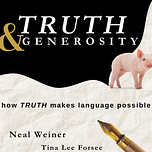“It is a long way from this hypothetical prehistory to now, but the direction is clear. However long the time and however complex the process, the generation of current language from these hypothetical beginnings would have taken place according to these same basic principles. Only one conclusion is possible: We have not left the epistemic Eden; we are as infallible as our forbears. Within a certain limited range, we, too, cannot be wrong.”
News, updates, etc.:
You can customize which bits of the newsletter you receive by visiting your account at any time. My regular posts will continue to be free.
Free PDF download of Neal’s Ph.D. thesis on Plato.
Free ebook of my senior thesis: Reconciling Science and Religion, a comparison of ancient and modern worldviews through Plato & Descartes.
We appreciate your support! Thank you!
—Neal and Tina
9
The Origin of Language
I SUSPECT THE FIRST WORDS ever spoken were not words at all, but sentences of some sort—I will call these first utterances ur-sentences—and I think it is possible that individual words separated from these ur-sentences in a way analogous to the process of semantic change.
But first, a word of caution: this is not an empirical historical analysis, but a thought experiment or an inquiry into the conditions that would make possible the genesis of language. I believe thinking about the origin of language is highly useful in helping us understand the subtle conceptual relations between meaning, use, truth, and the possibility of error. But in no important way does what has been said about generosity and semantic change require these speculations on origins. It is the other way around, actually. Our thesis about semantic change suggests an interpretation of origins which allows us to draw a preliminary conclusion about the relationship between truth and trust.
There is another reason to proceed with caution. Throughout the 19th century, debates on the origin of speech had become so contentious that, as contemporary writers are usually quick to point out, in 1866 and 1911, the Linguistic Society of Paris banned all papers on the subject. Max Mueller, who was himself one of the contenders, gave the various theories pet names. The yo-he-yo theory, for example, claimed the first speech was the song-cries of collective labor, the bow-wow theory claimed it all began with the imitation of animal sounds, the ding-dong theory sided with the imitation of object sounds, the pooh-pooh theory favored interjections, and the ta-ta preferred gestures, especially of the mouth and lips. Because these debates on language origin were as bitter as they were unresolvable, the subject fell into disrepute and was neglected by linguists for many years.
More recently, however, the topic has regained some respectability. This stems in part from Chomsky’s speculations about innate universal grammar, the increase in empirical knowledge about prehistoric man, the speculations of Charles Hockett, and the systematizations of Morris Swadesh. A ten thousand-entry bibliography was compiled by Gordon Hewes in 1974, and even in philosophy, W. V. Quine was not above some suggestive remarks about origin, though both he and Davidson put forth a different sort of thought experiment called radical interpretation which did not inquire into the origins of language, but instead involved imagining a field linguist who must translate a foreign language with no prior knowledge of it.
It may be the better part of valor to avoid the subject of origin altogether, but I think the thought experiments of Quine and Davidson were less decisive in establishing the inevitability of truth in the act of interpretation (although I will go into theirs in more detail later). In the case of the linguist parachuted in among the natives, there are already two sets of existing vocabularies that make it possible that both the natives and the interpreter could be speaking falsely. Because of that possibility we have to hedge everything said about generosity with the caveat: true given the best beliefs of the audience. But in our hypothetical beginning there is no need for translation between two pre-existing languages; ours concerns a language that doesn’t even exist yet. It will be recalled that when an object is present, the possibility of error lies only in the misuse of established meanings of words. In our thought experiment we eliminate the possibility of misusing established meaning because there is no established meaning. In ur-sentences there is absolutely nothing available to give meaning to words except the very objects described. In other words, our thought experiment takes us to the very bedrock of truth.
Without further ado, what might the ur-sentences have been like and how do we get from them to words and sentences as we know them?
Listen to this episode with a 7-day free trial
Subscribe to Philosophy and Fiction to listen to this post and get 7 days of free access to the full post archives.









